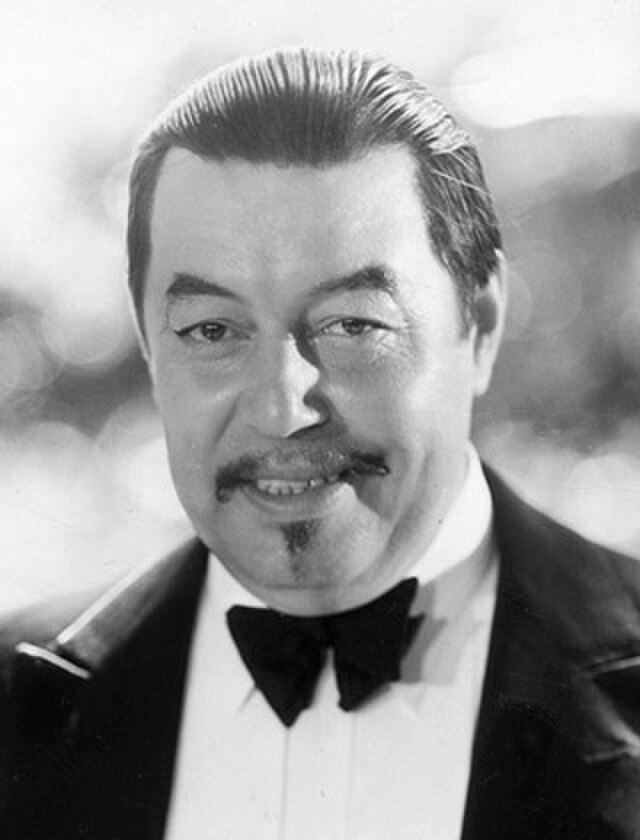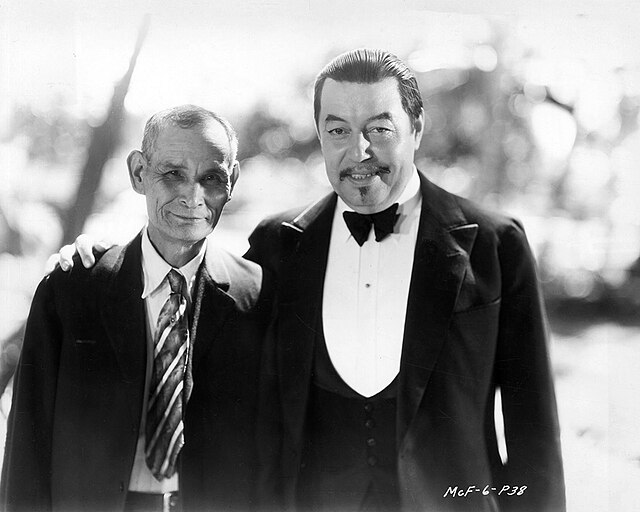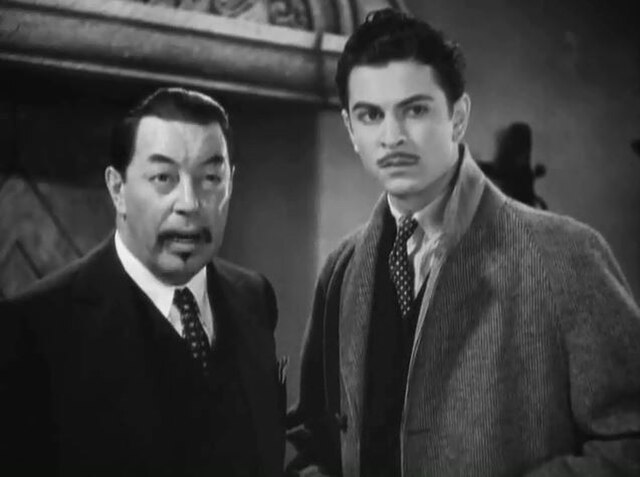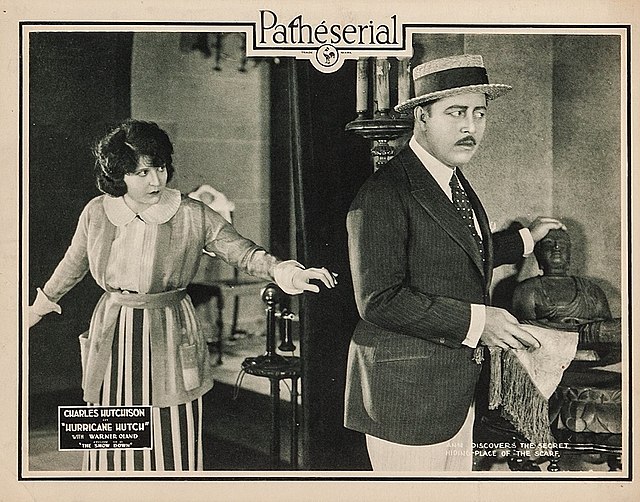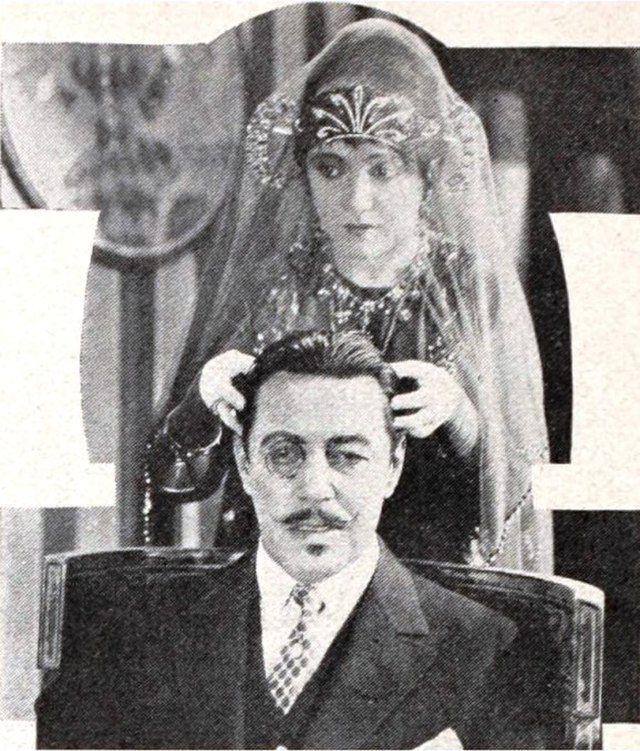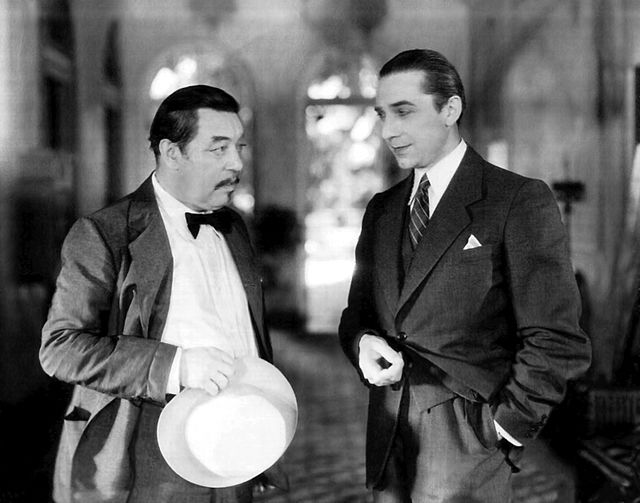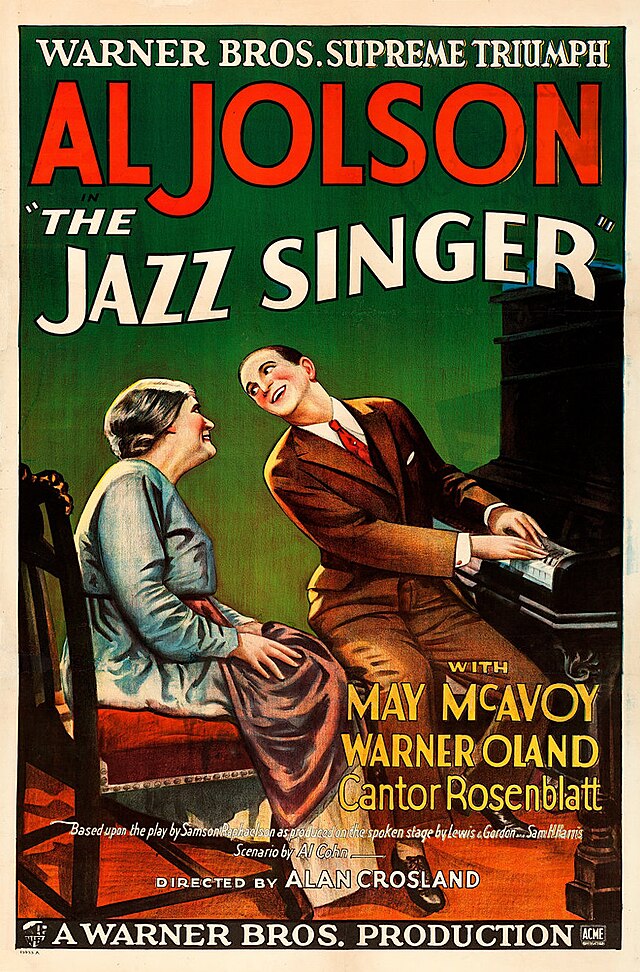Warner Oland
back| Full Name | Johan Verner Ölund |
| Stage Name | Warner Oland |
| Born | October 3, 1879 |
| Birthplace | Bjurholm, Västerbotten, Sweden |
| Died | August 6, 1938 |
| Buried | Southborough Rural Cemetery, Southborough, Massachusetts, USA |
| Married to | Edith Gardener Shearn (1907–1938, his death) |
| Children | None |
| Notable films | The Jazz Singer (1927) - The Mysterious Dr. Fu Manchu (1929) - Charlie Chan Series (1931 - 1935) |
Warner Oland
Hollywood's Master of Mystery
Warner Oland became famous for his portrayals of Asian characters in Hollywood films, despite being of Swedish descent. His career spanned silent films and talkies, and he was especially known for his nuanced performances as Charlie Chan, a role that brought him international fame. His life was marked by personal struggles with alcohol, and he died unexpectedly at 58 while visiting Sweden.
Related
Warner Oland (1879 – 1938)
Biography and Movie Career
Warner Oland, born Johan Verner Ölund on October 3, 1879, in Bjurholm, Västerbotten, Sweden, rose to fame as one of Hollywood's most enigmatic character actors, renowned for his portrayal of Asian characters in films such as The Mysterious Dr. Fu Manchu and the Charlie Chan series. His life was a remarkable journey from rural Sweden to the bright lights of Hollywood, filled with success, personal passions, and private struggles.
________________________________________
Early Life
Born to a working-class family, Oland spent his early years in Sweden before immigrating to the United States with his family when he was 13 years old. The family settled in Boston, Massachusetts, where young Johan immersed himself in American culture. He displayed a natural aptitude for languages and was fluent in Swedish, English, and later, Chinese—a skill that would prove invaluable in his acting career.
Oland pursued his education at the Boston Conservatory, focusing on music and drama. His love for the arts led him to New York City, where he joined theater productions and honed his craft.
________________________________________
Path Toward Success
Oland’s early acting career was rooted in Broadway, where his talent for characterization and his distinctive looks set him apart. His appearance was often described as "exotic," and he was frequently cast in roles that required an ambiguous ethnicity—a typecasting that would later define much of his film career.
He transitioned to film during the silent era, debuting in Pilgrims (1911). Throughout the 1910s and 1920s, he built a steady career in silent films, often portraying villains or mysterious figures. His big break came with The Jazz Singer (1927), the first feature-length film with synchronized sound. In the film, Oland played a Cantor, showcasing his dramatic range and ability to convey depth in complex roles.
In 1929, Oland starred in The Mysterious Dr. Fu Manchu, where he portrayed the titular character, a cunning and menacing mastermind. His performance was widely praised and led to a series of sequels. Despite criticism for perpetuating stereotypes, Oland’s work was considered groundbreaking for its time due to the dignity and intelligence he brought to these roles.
His greatest success came with the Charlie Chan series, starting with Charlie Chan Carries On (1931). Over the next several years, he starred in 16 films as the wise and affable Chinese-American detective, earning global acclaim. His portrayal made the character an enduring cultural icon.
________________________________________
Personal Life
Oland married Edith Gardener Shearn, a playwright and portrait artist, in 1907. The couple shared a deep love for the arts and collaborated on various projects. Edith, a creative force in her own right, supported Oland’s career and even translated some Chinese texts to help him understand his roles better.
Despite their strong bond, the marriage was not without difficulties. Oland struggled with alcoholism, which strained their relationship. The couple separated briefly in the mid-1930s, though they reconciled before his death.
Oland was passionate about languages, music, and Chinese culture. He immersed himself in the study of Chinese literature and philosophy, earning respect for his genuine interest and knowledge. He also enjoyed painting and writing, often retreating to his Massachusetts home to engage in these pursuits.
________________________________________
Death and Legacy
In 1938, Oland traveled to Sweden to visit his homeland. During the trip, he fell ill and was diagnosed with bronchial pneumonia. Complications from his illness led to his sudden death on August 6, 1938, in Stockholm, Sweden, at the age of 58.
Warner Oland was laid to rest at the Southborough Rural Cemetery in Massachusetts. His death marked the end of an illustrious career that had left a significant impact on Hollywood and audiences worldwide.
Short Video on Warner Oland
Physical Acting Style of Warner Oland
Warner Oland’s acting style was defined by subtlety, meticulous characterization, and an ability to evoke mystery and depth, which set him apart as a performer during Hollywood's golden age. His unique appearance and careful attention to detail made him one of the earliest "character actors" to achieve widespread fame.
Physicality and Presence
Oland’s physical presence was central to his acting. His broad frame, deliberate movements, and expressive face lent gravitas to his roles. He mastered the art of minimalism in performance, often conveying emotion through nuanced expressions and restrained gestures. His deliberate pacing—whether in a calm, calculating villain like Dr. Fu Manchu or the wise, measured Charlie Chan—drew audiences into his characters’ inner worlds.
Voice and Speech
One of Oland’s most compelling tools was his voice. He had a deep, resonant tone, which he modulated to suit the character at hand. As Charlie Chan, for instance, he employed a deliberate, soft-spoken delivery, imbued with warmth and intelligence. He used his ability with accents and inflections to create a sense of authenticity, particularly when playing characters of Asian descent. His ability to sound contemplative or authoritative added a layer of credibility to his portrayals, even when the scripts were laden with stereotypes.
Attention to Cultural Detail
Oland’s performances stood out because of his genuine effort to bring respect and authenticity to roles, particularly in his portrayals of Asian characters. He immersed himself in Chinese culture, studying language, philosophy, and literature. This informed his portrayal of Charlie Chan, making the character more than a caricature; instead, he imbued Chan with dignity, intelligence, and a quiet humor that resonated with audiences. Even in more problematic roles, like Dr. Fu Manchu, he avoided one-dimensional villainy, opting for complexity and intrigue.
Facial Expression and Emotional Range
Oland excelled at subtle emotional shifts, using his expressive eyes and a slight curve of the lips to convey a wide range of feelings. This skill was particularly evident in his silent film work, where he had to rely entirely on physicality and expression. Even as sound became dominant, he retained this precision, often delivering moments of unspoken connection or tension with just a look.
Adaptability Across Genres
Though most associated with mysteries and crime dramas, Oland’s versatility allowed him to perform in a variety of genres, from romantic dramas like The Painted Veil to horror films such as Werewolf of London. His ability to adapt his style—whether as a thoughtful detective, a sinister mastermind, or a tragic figure—showcased his depth as an actor.
Economy of Motion
Oland had a rare ability to command attention through stillness. His controlled movements often contrasted with more animated performers, allowing him to dominate a scene with quiet authority. This was particularly effective in roles like Charlie Chan, where his calm demeanor and understated reactions reinforced his character’s sharp intellect and unshakeable confidence.
Recognition for Warner Oland
While Oland may not have received formal accolades during his lifetime, his contributions to film history have been recognized posthumously. For instance, the Umeå European Film Festival in Sweden dedicated a program titled "Oland – Sveriges glömda Hollywoodstjärna" ("Oland – Sweden's Forgotten Hollywood Star") to honor his legacy.
Notable Movie Quotes of Warner Oland
Below are some memorable film lines from the portrayal of his character Charlie Chan.
• "Mind like parachute—only function when open."
• "Hasty conclusion like gunpowder—easy to explode."
• "The werewolf is neither man nor wolf, but a satanic creature with the worst qualities of both."
• "Politeness golden key that open many doors."
• "Every man must wear out at least one pair of fool shoes."
Movies with Warner Oland
• 1912: Pilgrim's Progress as John Bunyan (film debut)
• 1915: The Romance of Elaine
• 1915: Sin as Pietro
• 1915: The Unfaithful Wife
• 1915: Destruction as Mr. Deleveau
• 1916: The Fool's Revenge (uncredited)
• 1916: The Reapers as James Shaw
• 1916: The Eternal Sapho as H. Coudal
• 1916: The Eternal Question as Pierre Felix
• 1916: Beatrice Fairfax as Detective
• 1916: The Rise of Susan as Sinclair La Salle
• 1916: Beatrice Fairfax Episode 4: The Stone God as Detective in office
• 1917: Patria (Serial) as Baron Huroki
• 1917: The Fatal Ring (Serial) as Richard Carslake
• 1917: The Cigarette Girl as Mr. Wilson
• 1918: Convict 993 as Dan Mallory
• 1918: The Naulahka as Maharajah
• 1918: The Mysterious Client as Boris Norjunov
• 1918: The Yellow Ticket as Baron Andrey
• 1919: The Lightning Raider (Serial) as Wu Fang
• 1919: Mandarin's Gold as Li Hsun
• 1919: The Twin Pawns as John Bent
• 1919: The Avalanche as Nick Delano
• 1919: The Witness for the Defense as Captain Ballantyne
• 1920: The Third Eye (Serial) as Curtis Steele / Malcolm Graw
• 1920: The Phantom Foe (Serial) as Uncle Leo Sealkirk
• 1921: The Yellow Arm as Joel Bain
• 1921: Hurricane Hutch (Serial) as Clifton Marlow
• 1922: East Is West as Charley Yong
• 1922: The Pride of Palomar as Okada
• 1923: His Children's Children as Dr. Dahl
• 1924: The Fighting American as Fu Shing
• 1924: So This Is Marriage? as Mario Dorando
• 1924: One Night in Rome as King David
• 1924: Curlytop as Shanghai Dan
• 1925: Riders of the Purple Sage as Lew Walters aka Judge Dyer
• 1925: Don Q, Son of Zorro as The Archduke
• 1925: Flower of Night as Luke Rand
• 1925: The Winding Stair as Petras
• 1925: Infatuation as Osman Pasha
• 1926: Don Juan as Cesare Borgia
• 1926: The Mystery Club as Eli Sinsabaugh
• 1926: The Marriage Clause as Max Ravenal
• 1926: Twinkletoes as Roseleaf
• 1926: Tell It to the Marines as Chinese Bandit Chief
• 1926: Man of the Forest as Clint Beasley
• 1927: When a Man Loves as André Lescaut
• 1927: A Million Bid as Geoffrey Marsh
• 1927: Old San Francisco as Chris Buckwell
• 1927: What Happened to Father? as W. Bradberry, Father
• 1927: The Jazz Singer as The Cantor
• 1927: Sailor Izzy Murphy as The girl's father
• 1927: Good Time Charley as Good Time Charley Keene
• 1928: Stand and Deliver as Ghika - the Bandit Leader
• 1928: Wheel of Chance as Mosher Turkeltaub
• 1928: The Scarlet Lady as Zaneriff
• 1928: Dream of Love as The Duke, Current Dictator
• 1929: The Faker as Hadrian (the faker)
• 1929: Chinatown Nights as Boston Charley
• 1929: The Studio Murder Mystery as Rupert Borka
• 1929: The Mysterious Dr. Fu Manchu as Dr. Fu Manchu
• 1929: The Mighty as Sterky
• 1930: Dangerous Paradise as Schomberg
• 1930: The Vagabond King as Thibault
• 1930: Paramount on Parade as Fu Manchu (Murder Will Out)
• 1930: The Return of Dr. Fu Manchu as Dr. Fu Manchu
• 1931: The Drums of Jeopardy as Dr. Boris Karlov
• 1931: Dishonored as Colonel von Hindau
• 1931: Charlie Chan Carries On as Inspector Charlie Chan
• 1931: The Black Camel as Inspector Charlie Chan
• 1931: The Big Gamble as North
• 1931: Daughter of the Dragon as Fu Manchu
• 1932: Charlie Chan's Chance as Inspector Charlie Chan
• 1932: Shanghai Express as Henry Chang
• 1932: A Passport to Hell as Baron von Sydow, Police Commandant
• 1932: The Son-Daughter as Fen Sha
• 1933: Before Dawn as Dr. Paul Cornelius
• 1933: Charlie Chan's Greatest Case as Inspector Charlie Chan
• 1934: As Husbands Go as Hippolitus Lomi
• 1934: Mandalay as Nick
• 1934: Charlie Chan's Courage as Inspector Charlie Chan
• 1934: Bulldog Drummond Strikes Back as Prince Achmed
• 1934: Charlie Chan in London as Inspector Charlie Chan
• 1934: The Painted Veil as General Yu
• 1935: Charlie Chan in Paris as Inspector Charlie Chan
• 1935: Charlie Chan in Egypt as Inspector Charlie Chan
• 1935: Charlie Chan in Shanghai as Inspector Charlie Chan
• 1935: Werewolf of London as Dr. Yogami
• 1936: Charlie Chan at the Race Track as Inspector Charlie Chan
• 1936: Charlie Chan at the Circus as Inspector Charlie Chan
• 1936: Charlie Chan's Secret as Inspector Charlie Chan
• 1936: Charlie Chan at the Opera as Inspector Charlie Chan
• 1937: Charlie Chan at the Olympics as Inspector Charlie Chan
• 1937: Charlie Chan on Broadway as Inspector Charlie Chan
• 1937: Charlie Chan at Monte Carlo as Inspector Charlie Chan

